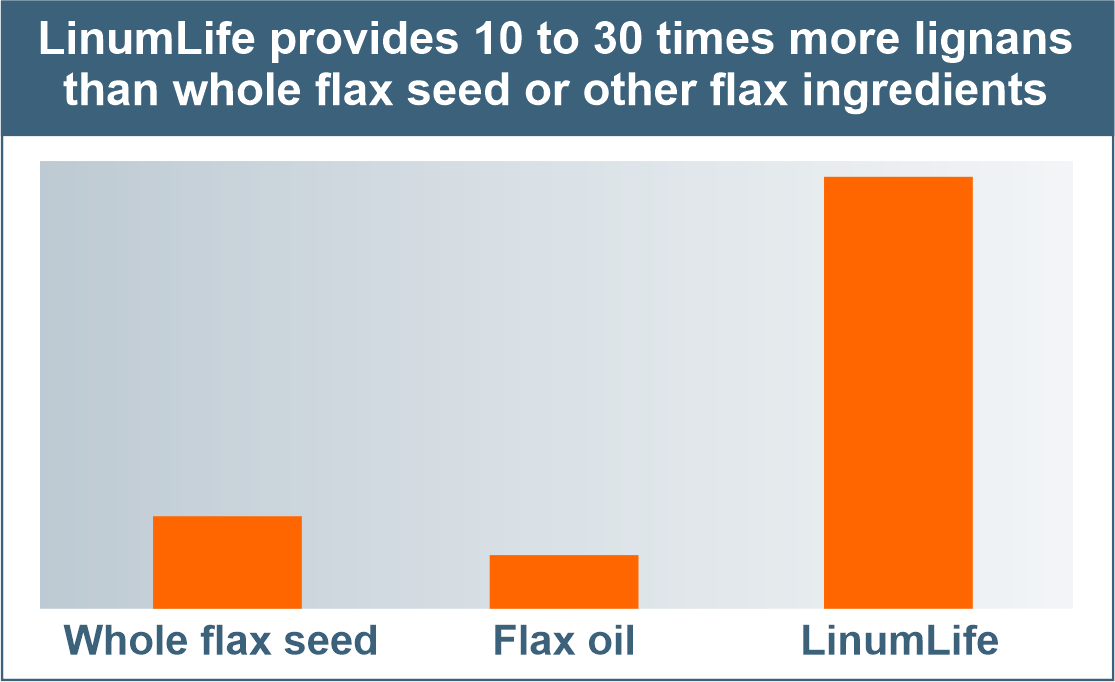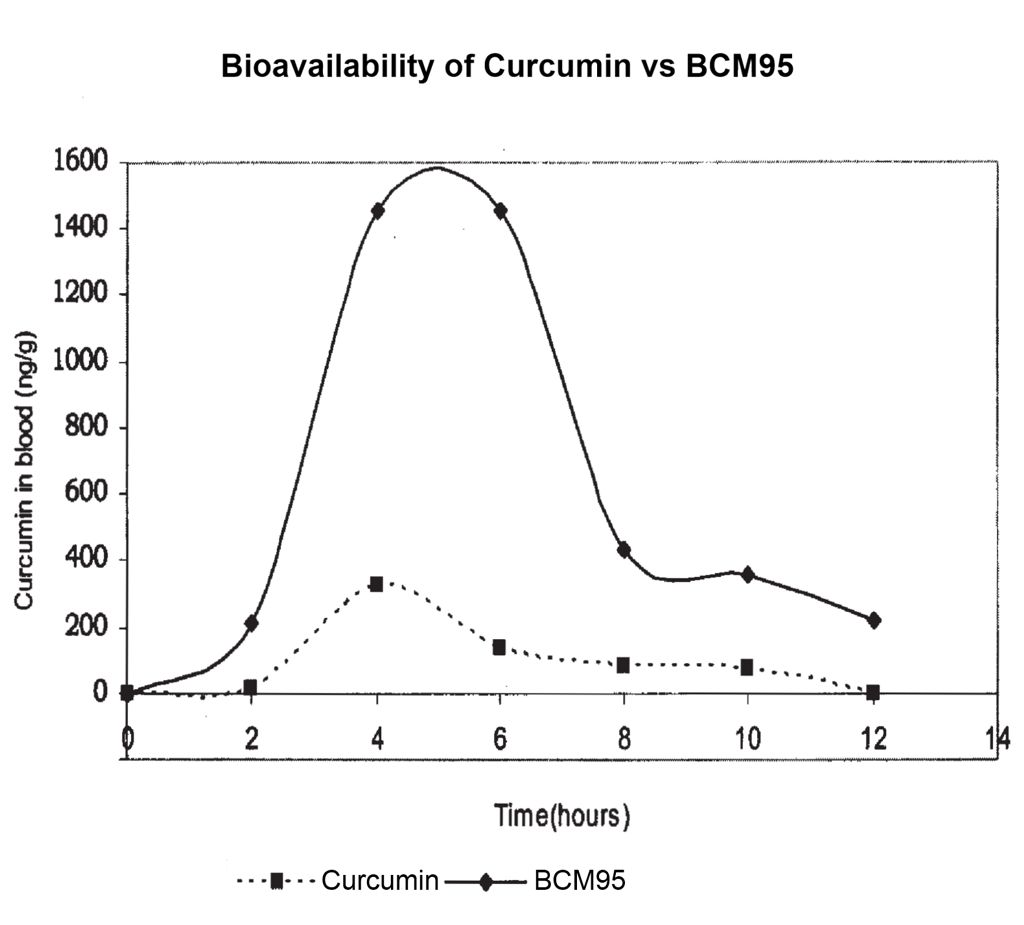ProstaSol™ – A natural treatment option for patients with prostate cancer
ProstaSol™ contains the following ingredients: LinumLife (Lignane from flax seeds), Regrestrol (various sitosterols), Biocurcumin BCM-95 (good bioavailable curcuminoide), and saw palmetto extract (Serenoa repens), Ginseng, (Panax ginseng), Baikal Skullcap (Scutellaria baicalensis), the African prune tree (Pygeum africanum), Reishi (Ganoderma Lucidum) and Japanese knotweed (Polygonum cuspidatum), which is the best natural source of resveratrol and quercetin.
In the Netherlands, ProstaSol™ is prepared as a food supplement; however, the manufacturing process follows international standards for the production of pharmaceuticals. ProstaSol™ is often used by urologists and oncologists as a complementary oncological treatment for patients who have prostate cancer.
Clinically proven effects of ProstaSol ingredients
LinumLife is a standardized extract from flax seeds, which is a plant-based food in Europe and Asia. The seeds are considered healthy as they provide vitamins, good fats, omega-3 fatty acids, and fibre. They also contain a high concentration of so-called lignans, which are phytoestrogenic compounds with beneficial effects for prostate health. Lignans exert a positive effect on the benign prostate enlargement. They reduce the size of the prostate gland and thereby decrease the risk of lower urinary tract symptoms in elderly men. In addition, lignans have a significant antioxidant and anti-inflammatory effects that keep cells healthy while also preventing cancer development.
Population studies have shown that a high intake of lignans is associated with lower rates of heart disease and certain cancers. Lignans also help regulate hormone levels including those responsible for supporting prostate health. A 2004 scientific report from the German Cancer Institute in Heidelberg recommended the use of flax seed oil and flax seeds in the prevention of breast and colon cancer. The lignans in LinumLife are clinically tested, safe, and generally well tolerated. At the concentration provided in ProstaSol, they will not cause any side effects.
Regrestrol (Sitosterol-Mix) contains four different sterols: Beta-Sitosterol, Campesterol, Stigmasterol and Brassicasterol. Sterol and Sterolin are actually plant fats that can be found in very high concentration in many nuts and seeds. Sterol and Sterolin are known for their healing properties in conjunction with prostate illnesses. European researchers confirmed in the renowned magazine “The Lancet” that plant-based sterols and sterolins effectively fight prostate illnesses.
For over twenty years, urologists have been successfully using sterols and sterolins instead of chemical preparations. Additional clinical studies have shown that sterols and sterolins have important inflammation-reducing properties and thus work as a prophylactic in conjunction with inflammation, diabetes, and cancer. These substances contain considerable adaptogenic properties, modulate the immune system, and protect healthy cells from being attacked by our immune system.
Due to this last characteristic, sterol and sterolin also help with auto-immune illnesses, which also plays a roll in the development of prostate conditions. In a randomized, placebo-controlled study of 177 patients with enlarged prostate glands, the effectiveness and safety of Beta-Sitosterol was tested and found to be sound. The results from patients receiving treatment with Beta-Sitosterol were much better than those of the control group, which received a placebo. Prostate illnesses declined greatly, and quality of life improved significantly.
Researchers at the University of Buffalo in the USA have concluded that sterols slow down the growth of prostate, breast, and colon cancers. In this study, the results of which were presented to the annual conference of American Research Biologists, phytosterol (Beta-Sitosterol) decreased the number of cancer cells by 60% in a lab test. It is also known that Beta-Sitosterol causes testosterone levels to sink, and decreases the activity of certain enzymes which convert this hormone into a biologically active form. The researchers also discovered that Beta-Sitosterol stimulates intercellular signal mechanisms and hinders uncontrolled cell splitting.
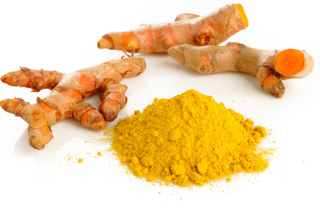
Biocurcumin BCM95® is a patented extract made from turmeric, which possesses a number of biological effects, such as antioxidants, anti-inflammatory, antibacterial, and anti-rheumatic effects and a significant anti-cancer effect. In contrast to normal turmeric extract, Biocurcumin BCM95 possesses an extremely high bioavailability (about seven times as great). That means that an oral dosage of only 250 mg of Biocurcumin BCM95 produces approximately the same blood-drug level as a dosage of 1,500 mg of normal turmeric extract, or about 37,500 mg of simple Curcumin Powder. Therefore, taking Biocurcumin BCM95 quickly delivers a therapeutic concentration of curcuminoids into the blood stream.
The BCM95 Complex positively distinguishes itself with the following properties:
- 100% natural turmeric extract (Curcuma longa) without added artificial ingredients
- clinical studies show that BCM95 Extract has a bioavailability that is seven to eight times better than other Curcumin extracts
- much smaller dosages are required to achieve the same effect of conventional curcumin extracts
- has a powerful antioxidant effect
- has extremely good anti-inflammatory properties
From a medical standpoint, the antioxidant, anti-carcinogenic, and the inflammatory reducing properties of the turmeric extract are of particular interest. These properties are used in the treatment of various diseases, such as intestinal, lung, and liver diseases, and with inflammatory diseases, Alzheimer’s, heart attacks, and cancer illnesses. Clinical tests and studies conducted on animals confirm in particular the cancer-reducing properties in the treatment of stomach, intestinal, liver, and skin cancer. Even advanced metastasis development can be considerably reduced through the use of Curcumin.
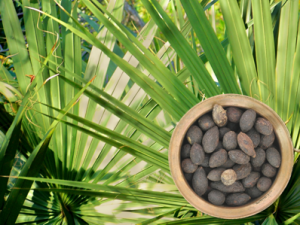
Saw palmetto (Serenoa Repens) The healing property of the lipophilic extract of the fruit of the saw palmetto (Serenoa repens) in conjunction with prostate illnesses has long been known. Randomized doubleblind studies have shown that saw palmetto extract is effective with benign prostate enlargement at a dose of 320 mg per day and that it greatly improves urinary and bladder function. The maximum, as well as the average urinary flow rate improved upon taking this extract. In comparison to the usual synthetic substances containing finasteride, saw palmetto has at least the same effectiveness with fewer side effects, is better tolerated, and the treatment is also much more cost-effective. Saw palmetto research has concentrated on its application in prostate treatment. Aside from positive effects on benign prostate issues, saw palmetto also has a proven effect in conjunction with prostate cancer. It hinders, fr instance, cell proliferation in prostate cancer tissue and supports the normal programmed cell death (apoptosis) of cancer cells.
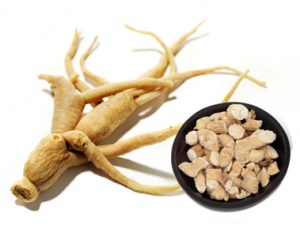
Ginseng preparations have long been known in China and other Asian countries for their broad health benefits. Ginsenoside and saponine are two main ingredients responsible for the pharmacological properties of ginseng root preparations. The substance saponin in particular inhibits breast and prostate cancer cells, In prostate carcinoma, it suppresses the PSA value. It also has a positive influence on androgen receptors and on the enzyme 5-alpha-reductase.
Ginsenosid supports normal programmed cell death (apoptosis) in prostate cells and reduces the activity of so-called Bcl-2 genes, which make cells invincible, thereby causing and supporting cancer. Moreover, ginsenosid restricts the process of metastasis and decreases the development of cancer cells in other tissues. Lastly, ginsenosid inhibits new growth of blood vessels, which leads to growth retardation of primary tumors and of metastasis (anti-angiogenetic effect).
Recent research results have shown that ginseng has a preventative effect on various kinds of cancer. Ginsenoside has a significant anti-inflammatory effect in addition to its cancer-inhibiting effect and thus also fights illnesses characterized by inflammation (for example, rheumatism or diabetes mellitus).
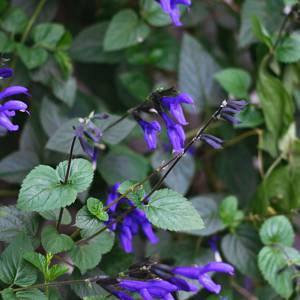
Baikal Skullcap (Scutellaria baicalensis) is one of the 50 fundamental herbs used in traditional Chinese medicine, where it has the name huángqín (Chinese: 黄芩).
The dried root extract from the Scutellaria baicalensis contains the flavonoid baicalin, which causes programmed cell death (apoptosis) in DU-145 prostate cancer even in very low concentration. That is why researchers at the molecular biological center at Valhalla University in New York were able to show in studies on prostate cancer cell cultures that scutellaria extract causes a reduction of about 65% in cancer cell growth and curbs PSA production in these cells.
Baicalin reduces growth not only in prostate cancer cells, but also in other types of cancer, such as lung cancer and brain tumors. Russian researchers have shown that baicalin has a positive effect on blood pressure regulation in patients with tumor anemia and minimizes the side effects of chemotherapy.
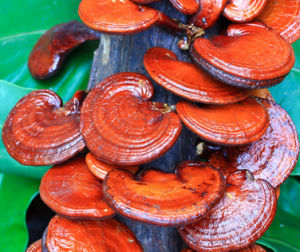
Reishi (Ganoderma lucidum) mushrooms have been used for over 4000 years in Chinese medicine. The ingredients within the fruit bodies of the mushroom, such as Triterpenoide, a sterole, manitol, coumarin, and various polysaccharides, are used medicinally. Furthermore, the mushrooms contain various trace elements, such as zinc, germanium, manganese, iron, copper, and even calcium. Recent research results show that reishi mushroom extract strengthens the immune system and also demonstrates immune modulating properties. The reishi has proven itself particularly useful in the treatment of prostate illnesses, since it inhibits prostate inflammation, thereby working against prostatitis. It also suppresses cell adhesion and cell migration in prostate cancer, thereby reducing tumor migration.
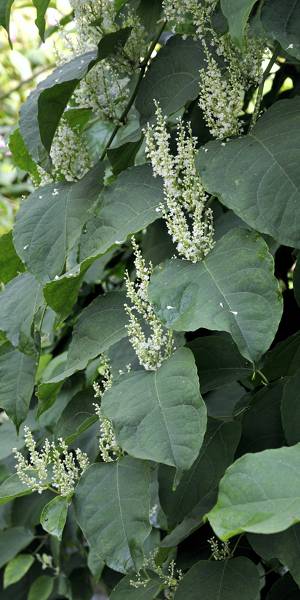
Japanese knotweed (Polygonum cuspidatum) is one of the best natural sources of resveratrol, a phytoalexin that has antioxidant, anti-inflammatory, and anti-cancer properties and which belongs to the category of polyphenols. Diverse clinical studies and animal tests with resveratrol demonstrate the positive effects of this substance on cancer, autoimmune diseases, arteriosclerosis, Alzheimer’s, cardiovascular diseases, and arthritis, among other illnesses. Polyphenols are also known for their high redox potential, which makes them ideal free radical scavengers. Like coenzyme Q10, resveratrol can seal-off proton leaking mitochondria and neutralize reactive oxygen-based free radicals.
Resveratrol stimulates a number of the body’s own antioxidant systems (for example, the superoxide dismutase and some catalases). In addition, resveratrol prevents lipid peroxidation of LDL-Cholesterol. The oxidized form of this low density fat can be stored in the vessel walls and facilitate the development of arteriosclerotic plaques. Resveratrol prevents this process and therefore works against the calcification of the blood vessels.
The positive effect of resveratrol in various disease states is due, at least in part, to its significant anti-inflammatory properties. A number of studies have shown that chronic inflammations is extremely important for the pathogenesis of many diseases, from arteriosclerosis, to neuronal degeneration, to the formation of cancer. As early as the 90‘s, it was demonstrated that resveratrol possesses an anti-cancer effect at all three levels of the disease: it prevents cancer development, it reduces cancer growth, and reduces metastases formation. Resveratrol induces programmed cell death (apoptosis), increases the effectiveness of conventional chemotherapy or radiation, and counteracts treatment resistance.
Quercetin is also extracted from the so-called secondary plant matter (flavonoid) of Polygonum cuspidatum. This substance has impressive antioxidant, anti-inflammatory, and immune-modulatory effects and regulates the cell cycle. Quercetin is virtually non-toxic when taken orally or intravenously. Studies from the famous Mayo Clinic and the Dana Farber Cancer Institute at Harvard University in the USA have shown that Quercetin blocks the growth of androgen-sensitive and hormone-resistant prostate cancer cells, making them sensitive to heat; the substance is therefore suitable to support hyperthermia treatments. Quercetin is not only applicable as a treatment and prevention substance in prostate cancer, however. It is also applicable in conjunction with breast cancer, colon cancer, lung cancer, and several other types of cancer.


